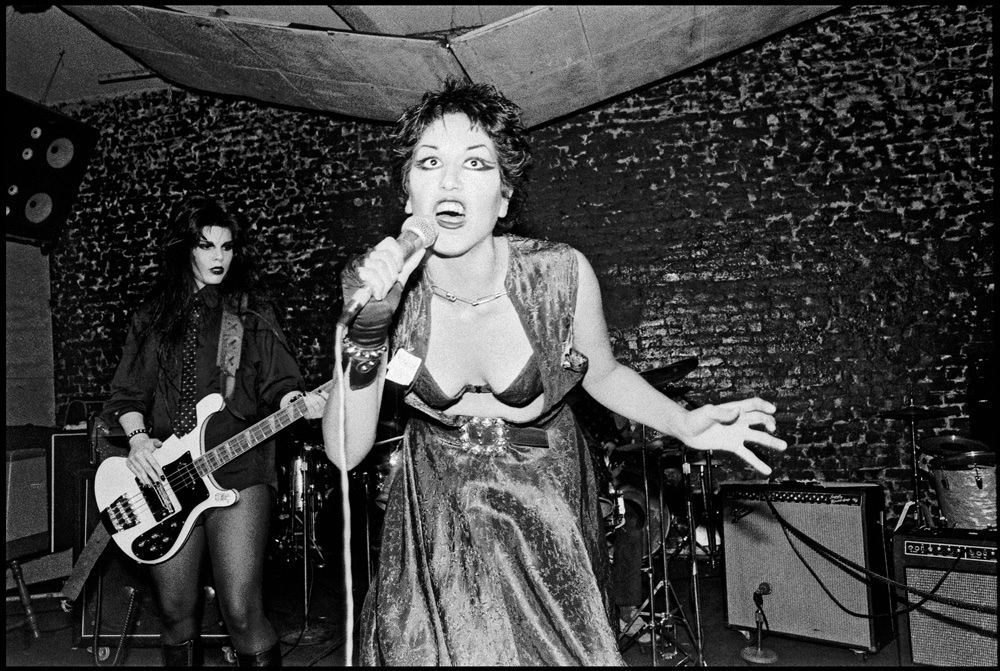A visual history of San Francisco’s industrial scene
- Text by Miss Rosen
- Photography by Ruby Ray

While working at Tower Records in San Francisco during the summer of 1977, Ruby Ray spotted V. Vale, a mysterious figure she had seen walking through North Beach. He was dressed in leather, long scarves, and carrying a stack of magazines under his arm.
“I was working at the cash register and I told the guy, ‘Look I have to leave right now!’” Ray remembers. “I ran after Vale and asked him what he had, and he showed me the magazine, Search & Destroy. I asked, ‘Don’t you need more photos?’ and he said, ‘Yeah, do you know any photographers?” I said, ‘Yes, me!’ That’s how it all started.”
From that fated encounter, a historic collaboration was born, one that unfolds masterfully in the new book, Ruby Ray: Kalifornia Kool, Photographs 1976-1982 (Trapart Books).

Booji Boy Finds Pretty Pictures, 1977. Mark Mothersbaugh, in his alter ego as Booji Boy, shops at the Wharf.

Z’EV was Cooked, 1979. Z’ev, industrial shaman using swinging oil drums, was cooked for Rhythm & Noise Live Spectacle.
Whether she was documenting the Mutants playing a show for the inmates at Napa State Mental Hospital in 1978, or going backstage at the Mabuhay to photograph Sid Vicious after he tried to upstage the Bags by going on stage and cutting himself with broken glass, Ray captures the gritty glamour of SF punk as it hit the world stage.
As an insider, Ray saw it all, on stage and off. Her photographs of the Cramps, Devo, Darby Crash, Alice Bag, Exene Cervenka, Bruce Conner, William S. Burroughs and Cosey Fanni Tutti evoke the sensation of pure consciousness, of living in and for the moment. For her first shoot, she spent the day with the Dills, before heading to their gig later that night. “They totally blew me away,” she says. “I was so excited I couldn’t contain myself.”

Bruce and Jean, 1979. Artist and Filmmaker Bruce Conner with his artist/wife Jean Conner under a cobweb in their yard.

The Bags, 1978. Alice Bag sings and snarls. Pat Bag later played in the Gun Club and the Damned.
“My boyfriend at the time wasn’t into punk rock, so he wasn’t my boyfriend that long. But when he picked me up after the show was over, I got into the backseat of the car and I vomited because I had been dancing so crazy — it’s like I had to purge my past by puking it up.”
Her boyfriend, like many others, was not thrilled: “People hated [punks] and were constantly mocking us. They didn’t write about us in the paper. We were forming our own subculture because no one cared about us.”
“San Francisco is a small city, so a lot of cross currents were happening. It was a competitive period. Everyone was trying to be more artistic or a better band or wilder clothes – everyone was doing something to contribute to the punk ethos.”

Slits – She Bit the Apple, 1981. Viv Albertine and Ari Up, on tour with the Slits from London, connect with the mythic on the RE/Search roof.

Nam Nico on the Razor’s Edge, 1979. Former Velvets’ Chanteuse at the Mabuhay with her epithet “She runs through the world like an open razor, and one might get cut.”
Ruby Ray: Kalifornia Kool, Photographs 1976-1982 (Trapart Books) launches on March 28 at City Lights Bookstore, San Francisco.
Follow Miss Rosen on Twitter.
Enjoyed this article? Like Huck on Facebook or follow us on Twitter.
Latest on Huck

Analogue Appreciation: lullahush
Ithaca — In an ever more digital, online world, we ask our favourite artists about their most cherished pieces of physical culture. Today, it’s Irish retro-futurist lullahush.
Written by: lullahush

Spyros Rennt captures connection and tenderness among Berlin’s queer youth
Intertwined — In the Greek photographer’s fourth photobook, he lays out spreads of togetherness among his friends and the German capital’s LGBTQ+ party scene.
Written by: Isaac Muk

The rebellious roots of Cornwall’s surfing scene
100 years of waveriding — Despite past attempts to ban the sport from beaches, surfers have remained as integral, conservationist presences in England’s southwestern tip. A new exhibition in Falmouth traces its long history in the area.
Written by: Ella Glossop

Plestia Alaqad: “Journalists should focus on humanising people”
Huck’s April interview — Having become one of the most crucial and followed voices from inside Gaza in the aftermath of October 7, the award-winning author and journalist is releasing a new memoir, ‘The Eyes of Gaza’, collating diary entries made over the past 18 months. We caught up with her to hear more about it.
Written by: Isaac Muk

The instrument makers taking DIY music to a whole new level
What does it take to construct a modular synth? How do you turn a block of wood into a double bass? Here, four craftspeople explain why they chose to rip up the rulebooks and build their own music-making machines.
Written by: Daniel Dylan Wray

Southbank Centre reveals new series dedicated to East and Southeast Asian arts
ESEA Encounters — Taking place between 17-20 July, there will be a live concert from YMO’s Haruomi Hosono, as well as discussions around Asian literature, stage productions, and a pop-up Japanese Yokimono summer market.
Written by: Zahra Onsori